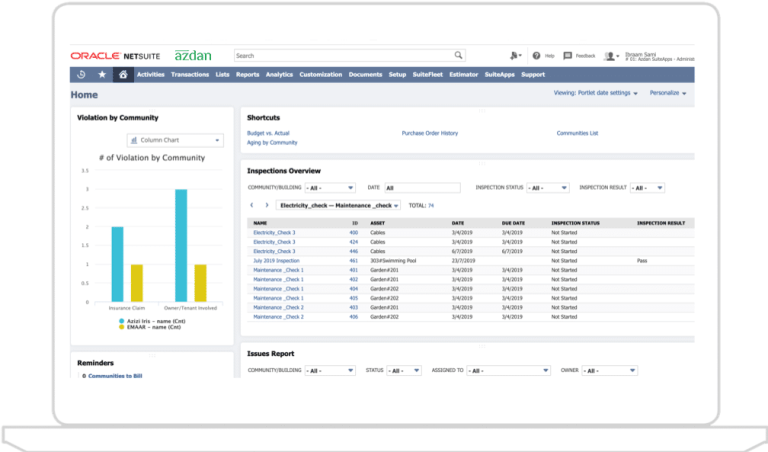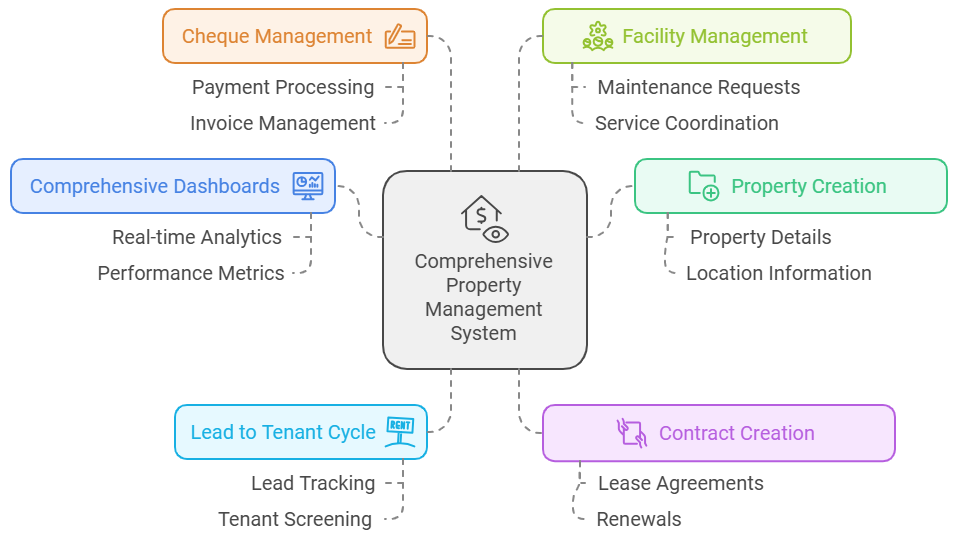
Overview on NetSuite for Real Estate Management Solution
In the constantly changing real estate market, managing properties, tenants, and financial transactions efficiently is essential. Without the right technology, handling these different tasks can be difficult and slow down growth and operations.
NetSuite for Real Estate Management, a robust and versatile ERP system, has emerged as a game-changer for the real estate industry. By automating routine processes, enhancing visibility into key metrics, and streamlining property management workflows, NetSuite empowers real estate professionals to focus on what truly matters: strategic growth and cultivating lasting tenant relationships.
With a suite of features specifically designed to address the unique challenges of the real estate sector, NetSuite provides a comprehensive solution that covers everything from property accounting and lease management to work order tracking and tenant communication. By centralizing critical data and automating repetitive tasks, NetSuite frees up valuable time and resources, allowing property managers to make data-driven decisions that drive sustainable growth.
Moreover, NetSuite’s robust financial management capabilities offer unparalleled insight into the financial health of real estate portfolios. By automating financial processes, such as accounts receivable, accounts payable, and revenue recognition, NetSuite ensures accurate and timely financial reporting, enabling property managers to optimize their operations and maximize profitability.
7 NetSuite for NetSuite for Real Estate Management Capabilities

1. Comprehensive Property Management Solution
NetSuite for Real Estate Management is fully integrated with NetSuite and can be customized for compatibility with other platforms as needed. This robust, scalable solution helps real estate businesses simplify essential processes such as property setup, tenant oversight, contract formulation, rent collection, and revenue recognition. With this solution integrated into NetSuite’s extensive ERP suite, companies can harness powerful features that support end-to-end business management.
2. Comprehensive Dashboards
Our real estate management platform includes a variety of intuitive dashboard portlets for comprehensive insights, such as trend graphs, lists, and analytics. The property management-specific dashboards cover:
- Property Occupancy Ratio Status
- Pending Tenant Requests
- Lease Agreement Status
- Lease Settlement Status
3. Property Creation
The REM solution allows for the straightforward creation and configuration of properties and units, complete with feature definitions.
When setting up properties or units, you can:
- Specify the address
- Define property type
- Attach images
- Set Owner Agreements
For individual units, the system lets you define:
- Intended purpose
- Property type
- Regulatory details
- Unit-specific features
4. Lead to Tenant Cycle
Track and manage the full tenant lifecycle efficiently—from identifying prospective tenants to finalizing tenancy agreements. Real-time dashboards provide sales representatives and managers with enhanced visibility, enabling them to drive renewals, upsell, and meet customer expectations.
With built-in CRM tools, you can:
- Oversee the tenant lifecycle
- Manage rental advertising
- Process rental applications
- Handle document and communication management
5. Contract Creation
Creating and maintaining tenancy contracts has never been simpler. The contract module ensures compliance with local regulations and includes all necessary fields to avoid missing any critical information.
Features of the contract creation process include:
- Filling in comprehensive details as per local real estate guidelines
- Attaching relevant documents
- One-click invoicing initiation
6. Cheque Management
NetSuite enables the recording of current and post-dated checks for each tenant. These post-dated checks can be monitored through user-friendly dashboards, providing real-time updates as they become due.
7. Facility Management
The property management solution also incorporates robust facility management capabilities. Support and maintenance tickets can be generated, tracked, and assigned to maintenance teams, with live progress monitoring. Tenant and support team interactions are recorded to ensure smooth communication and service.
Facility maintenance linked to contracts can be tracked, enabling thorough analysis and informed decision-making.
4 Challenges of Lead Analytics with NetSuite for Real Estate Management
While leveraging lead analytics through NetSuite for Real Estate Management offers significant benefits, the industry does face some challenges:
1. Data Integration and Quality
One of the foremost challenges in lead analytics within NetSuite for Real Estate Management is integrating data from diverse sources. Real estate firms gather extensive data from multiple channels, such as property listings, client interactions, financial records, and market trends. Achieving seamless integration while ensuring data quality across these various sources can be complex. Discrepancies in data formats, standards, and completeness can impede the effectiveness of analytics efforts.
2. Complexity of Data Analysis
The complexity of real estate data presents a significant hurdle in extracting meaningful insights. NetSuite for Real Estate Management must offer intuitive interfaces and robust analytical tools to help users navigate and interpret vast datasets. Addressing these complexities is crucial for stakeholders to draw actionable intelligence from the data at their disposal.
3. Privacy and Compliance
With rising concerns surrounding data privacy and stringent regulations, real estate companies need to handle sensitive information with caution. NetSuite for Real Estate Management must incorporate strong security protocols to protect client data and ensure adherence to privacy laws such as GDPR. Balancing comprehensive analytics capabilities with stringent compliance requirements is both critical and challenging.
4. Implementation and Adoption
The successful deployment of NetSuite for Real Estate Management depends on overcoming resistance to change and providing thorough training for all stakeholders. Employees accustomed to traditional methods may resist adopting new systems, potentially hindering the transition to ERP-driven lead analytics. Comprehensive training programs and a phased implementation approach are essential to reduce disruptions and fully leverage the new system’s benefits.
The Power of Data Analytics in NetSuite for Real Estate Management

NetSuite for Real Estate Management is transforming the industry by harnessing data analytics. By consolidating multiple data sources, these solutions offer a 360-degree view of operations, enabling informed decision-making, workflow optimization, and competitive advantage.
Understanding Market Trends
NetSuite’s lead analytics enables real estate businesses to accurately identify market trends. The insights provided help stakeholders anticipate market shifts, supporting strategic planning and investment decisions. These insights span property valuations, demand trends, and regional preferences.
Enhancing Operational Efficiency
Operational efficiency is fundamental to the success of any real estate firm. NetSuite for Real Estate Management minimizes redundancies and enhances efficiency by centralizing data, automating routine tasks, and streamlining processes. With lead analytics, businesses can identify bottlenecks, optimize workflows, and ensure resources are used effectively.
Risk Mitigation and Compliance
Compliance and risk management are indispensable in the real estate sector. The powerful analytics capabilities within NetSuite provide real-time insights into potential risks and ensure compliance with industry regulations. This proactive approach empowers businesses to address risks before they escalate.
Forecasting and Decision-making
Effective decision-making is vital for long-term success. NetSuite’s lead analytics provide accurate forecasts based on historical data and current market trends. This foresight enables decision-makers to develop strategies that align with market dynamics, fostering a proactive rather than reactive approach.
Conclusion
Integrating lead analytics with NetSuite for Real Estate Management is transformative in an industry defined by vast data and shifting trends. By understanding market trends, enhancing operational efficiency, managing risks, and nurturing customer relationships, businesses can position themselves as leaders. However, addressing challenges such as data integration, complexity, compliance, and adoption is essential for unlocking the full potential of data-driven insights.
NetSuite for Real Estate Management acts as a catalyst, converting raw data into actionable insights, enabling businesses to thrive in an increasingly competitive landscape.
Schedule a free consultation with a premier NetSuite Implementation Partner today.






